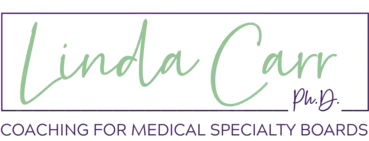
Achieving Success on Medical Specialty Boards in Spite of a Learning Disability: One Physician’s Story

For some physicians, it’s the realization of exam failure for the very first time. For others, it might be multiple failed attempts at passing their boards.
Failing medical boards holds physicians hostage professionally. They see their colleagues move forward in their careers while they’re unable to advance. Failure takes a toll both professionally and personally.
Professionally, physicians who are not board certified may have restricted hospital privileges, insurance carriers may not accept them, and they may find it difficult to join medical practices.
Personally, physicians who fail their boards take a big hit emotionally. It makes them feel less than, not up to par with their colleagues. It can affect their well-being, leading to disappointment, discouragement, and depression.
I’d like to share a client story with you (her name and specialty have been changed).
After several failed attempts at passing her medical specialty boards, Carol, an internist, contacted me to enroll in my medical specialty board preparation program. Her dogged attempts at passing her boards meant reduced (or no) vacations, no end-of-year bonus from her group practice, and an intense feeling of failure as a medical professional.
As we worked together, Carol learned how to make her study more meaningful and memorable by expanding her learning strategies and being more thoughtfully engaged as she planned for and implemented her study routines. She followed study schedules that focused on high-yield topics and areas that needed more study. Carol also incorporated time management and anxiety/stress reduction practices. After assessing her test-taking performance over time, I suggested that she seek neuropsychological testing to see if there was evidence of a learning disability (LD).
To Carol’s surprise, she was diagnosed with attention-deficit/hyperactivity disorder (ADHD). She immediately applied to her medical board for testing accommodations (i.e., two days to take her boards rather than one day and a private room)–this was granted. Her intensive board preparation and the testing accommodations provided by the test center definitely made a difference–she passed!
While it is unusual for physicians to discover a LD this late in their career, it is not uncommon. A physician with a record of multiple board attempts and failures might be a suitable candidate for comprehensive neuropsychological evaluation. This procedure determines the source of the difficulty as well as the areas of neurocognitive strength that can provide compensatory strategies and treatment options. Neuropsychological testing may include a memory test, cognition test, verbal communication test, motor tests, as well as hearing and vision.
With the high investment of time, energy, and money in intensive board preparation, failure to pass is devastating to physicians and their families. You don’t have to have a learning disability in order to work with an academic/learning coach. Coaches can offer many different services. I would recommend a program that includes identifying your learning preference(s); expanding your learning potential; monitoring your test-taking skills; and learning how to reduce stress and test anxiety. If you are planning to take your medical specialty boards this year or in the future, make your board preparation easier by having a “Guide at Your Side”.
____________________
Linda L. Carr, Ph.D., Founder/Principal at Coaching for Medical Specialty Boards, is a medical educator and learning specialist who coaches physicians preparing for specialty boards through virtual, one-on-one coaching. Visit www.DrLindaCarr.org to learn more about her program and download her FREE Study Guide.
